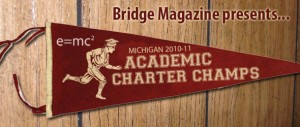A push and helping hands aid science success
Talk to Ned Milne, science teacher at Woodland School, and it becomes clear how that Traverse City charter school earned its success in teaching the subject.
For starters, all science classes are electives. Where students at other schools may be herded into general grade-level classes, at Woodland they choose among ecology, biology, chemistry and earth science. For middle school-level students -- what the K-8 school calls its “upper village” -- that amount of autonomy makes a big difference in how and what they learn, Milne said.
“They choose to be there,” he said. “That’s probably unusual.”
And successful. Woodland School tied with New Bedford Academy in Lambertville, Midland Academy for Advanced and Creative Studies and the Martin Luther King Jr. Education Center in Detroit for Bridge’s charter champs in 8th Grade Science for the 2010-11 school year, among schools with less than 40 percent of students qualifying for free lunch. Among schools with more economically disadvantaged students, David Ellis Academy also tied at 100 percent, for both their Detroit and Redford campuses.
As part of its "Academic State Championship" coverage, Bridge Magazine used a database to analyze results from all of Michigan's charter schools on eight academic measures, then divided the results into two groups based on the socioeconomic characteristics of their student bodies.
BRIDGE DATA: List of winners and searchable database of charter performance
As in other academic areas, educators stressed the need for high expectations. Classes at Woodland are taught at the high-school level, Milne said.
“I have always felt, and in 15 years have learned, (that) these kids can give a lot more than we give them credit for,” he said. “We convince them of how smart they are and what they're capable of.”
Betsy Haigh, dean of the Midland Academy, echoed his beliefs. Starting in fifth and sixth grades, students turn to “inquiry-based labs” in their science classes, which, combined with Midland’s generally rigorous curriculum, leaves students easily able to achieve proficiency on their eighth-grade Michigan Educational Assessment Program tests.
 “Our high school program really starts in the middle-school grades,” Haigh said.
“Our high school program really starts in the middle-school grades,” Haigh said.
At New Bedford, Principal Greg Sauter credits not only in-class instruction but science-based extracurriculars, including a science club that meets after school every other week to perform experiments. That activity is capped at 25 students, and frequently fills up, Sauter said. The school also does a biennial science fair, alternating with a geography fair.
At the David Ellis Academy campuses, Sylvia Green, school director, said they’ve learned to be resourceful with what they have.
“Sometimes it is very challenging,” she said. “That is why we have to be creative.”
One David Ellis Academy teacher is married to a Wayne State University science professor, who taught eighth-graders at the beginning of the year. “We did not necessarily have the equipment needed (for the class), but he brought in pictures and various artifacts they could look at. He volunteered his time and came twice a week,” Green said.
“The kids help each other,” she added. “They have their own study groups, they have teachers’ lunchtime round table. It allows the student, if there was a problem or something else going on, to talk about in a very small group. So they feel a connection to the teachers.”
Dana Hollowell contributed to this report
Nancy Derringer has been a writer, editor and teacher in Metro Detroit for seven years, and was a co-founder and editor of GrossePointeToday.com, an early experiment in hyperlocal journalism. Before that, she worked for 20 years in Fort Wayne, Indiana, where she won numerous state and national awards for her work as a columnist for The News-Sentinel.
Dana Hollowell is the first holder of the Center for Michigan’s student fellowship. An award-winning journalist, she has experience in the broadcast and print media. Hollowell grew up in the Detroit metropolitan area.
Michigan Education Watch
Michigan Education Watch is made possible by generous financial support from:
Subscribe to Michigan Education Watch
See what new members are saying about why they donated to Bridge Michigan:
- “In order for this information to be accurate and unbiased it must be underwritten by its readers, not by special interests.” - Larry S.
- “Not many other media sources report on the topics Bridge does.” - Susan B.
- “Your journalism is outstanding and rare these days.” - Mark S.
If you want to ensure the future of nonpartisan, nonprofit Michigan journalism, please become a member today. You, too, will be asked why you donated and maybe we'll feature your quote next time!



